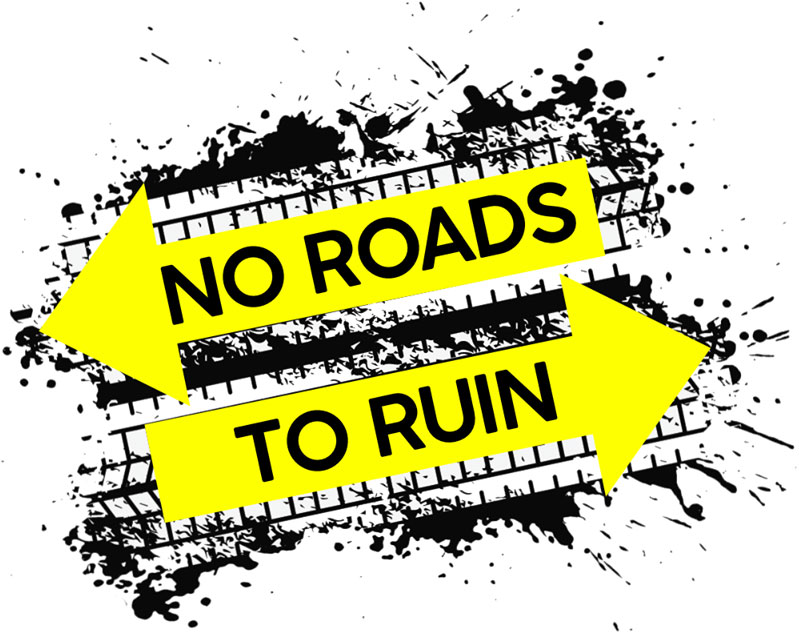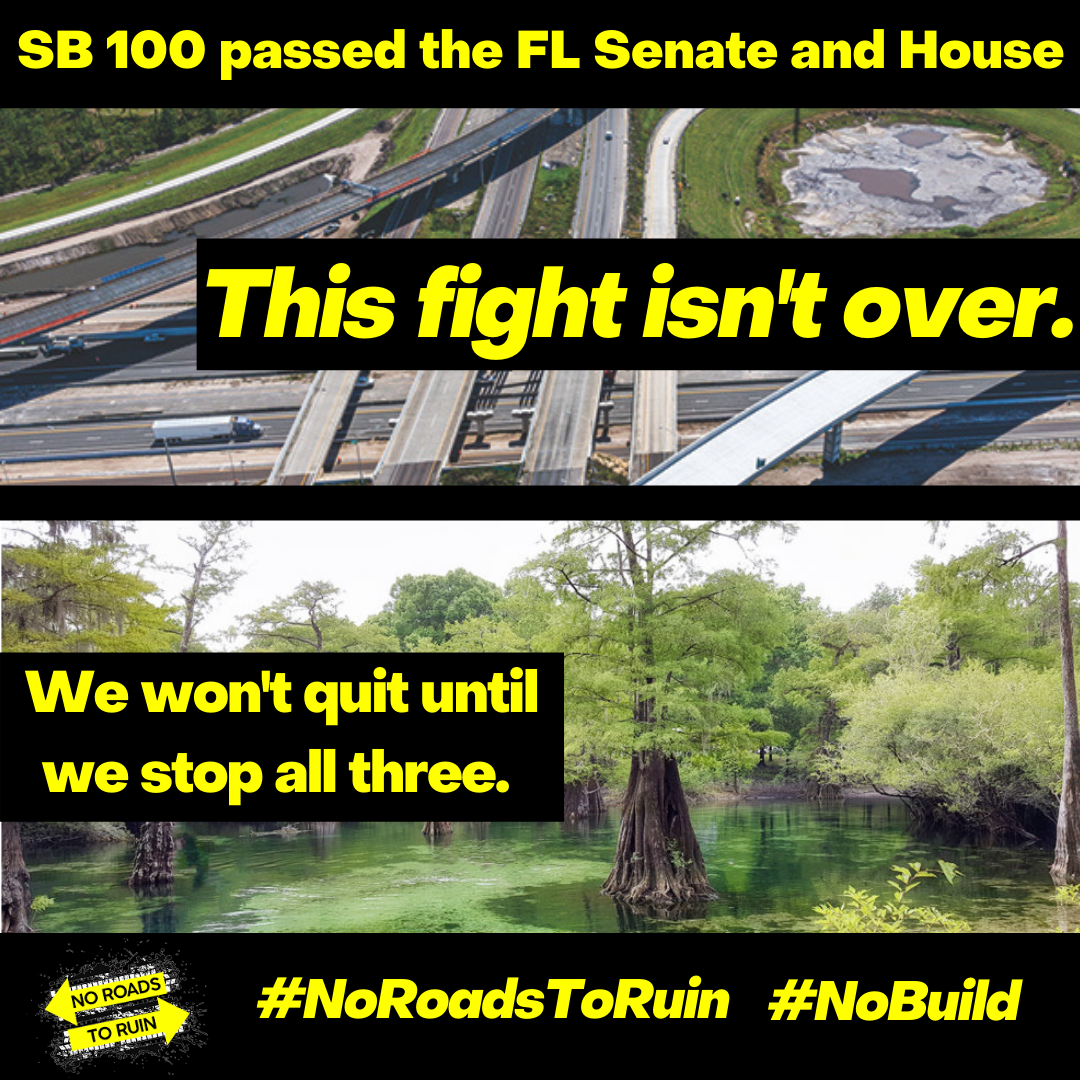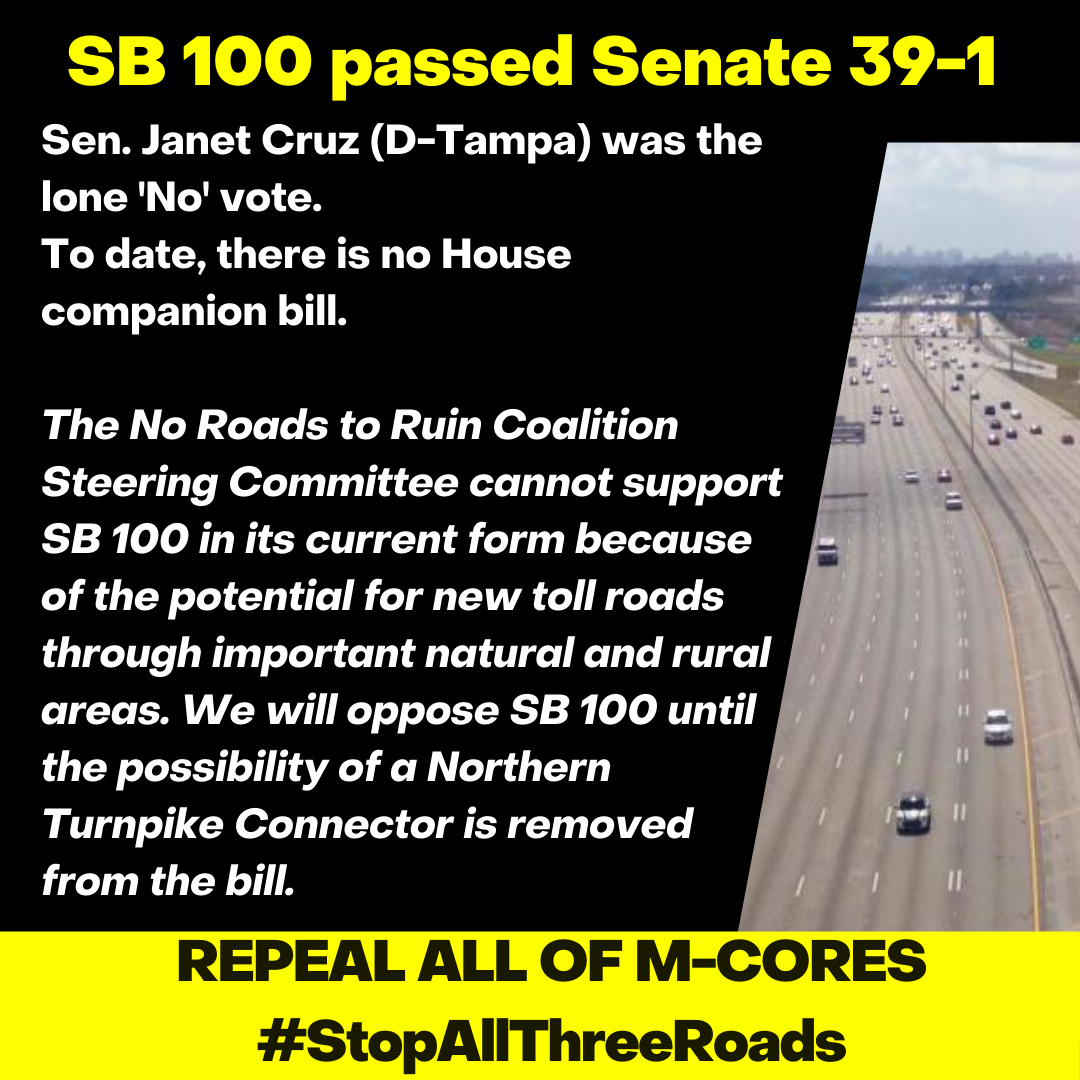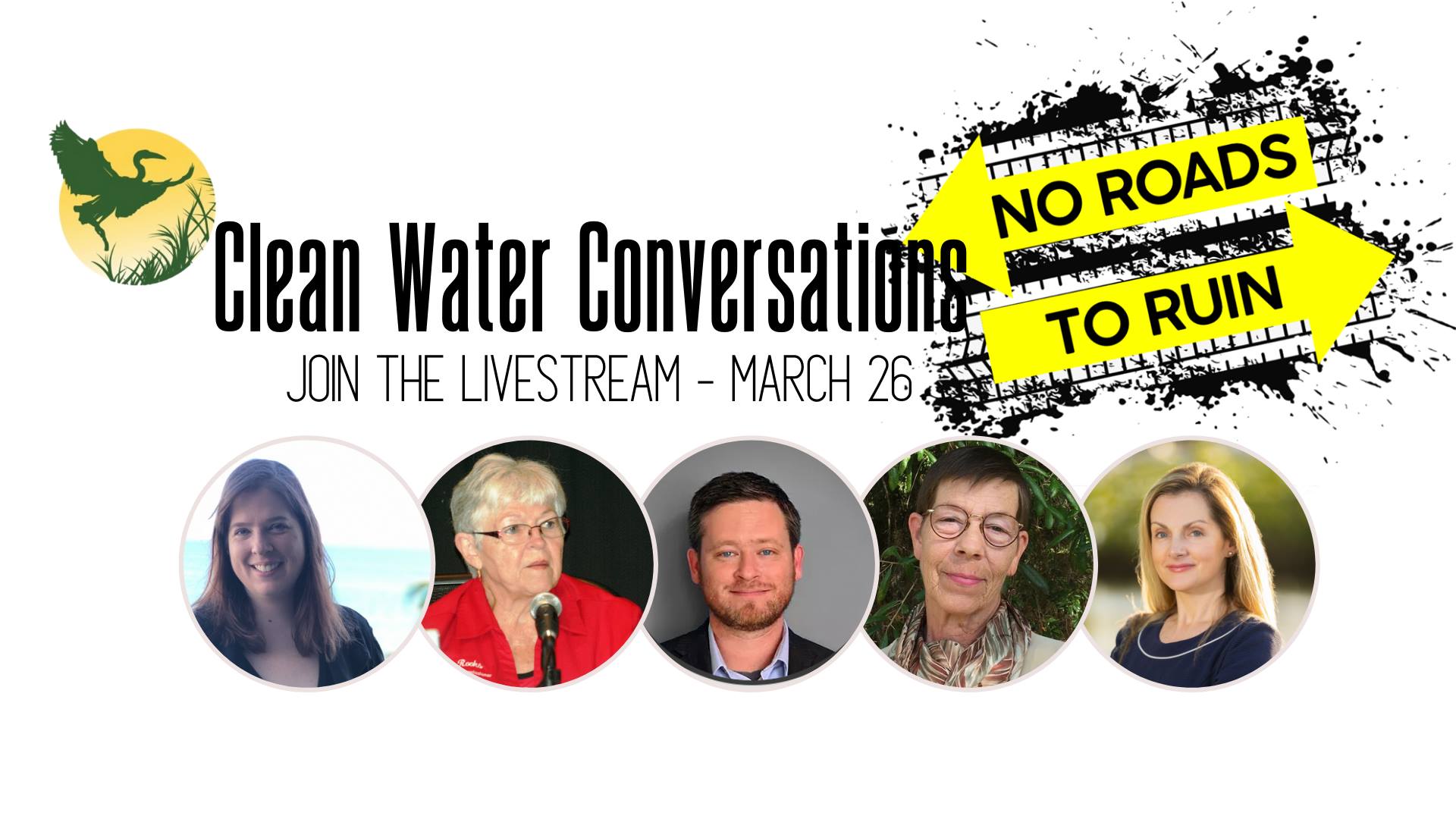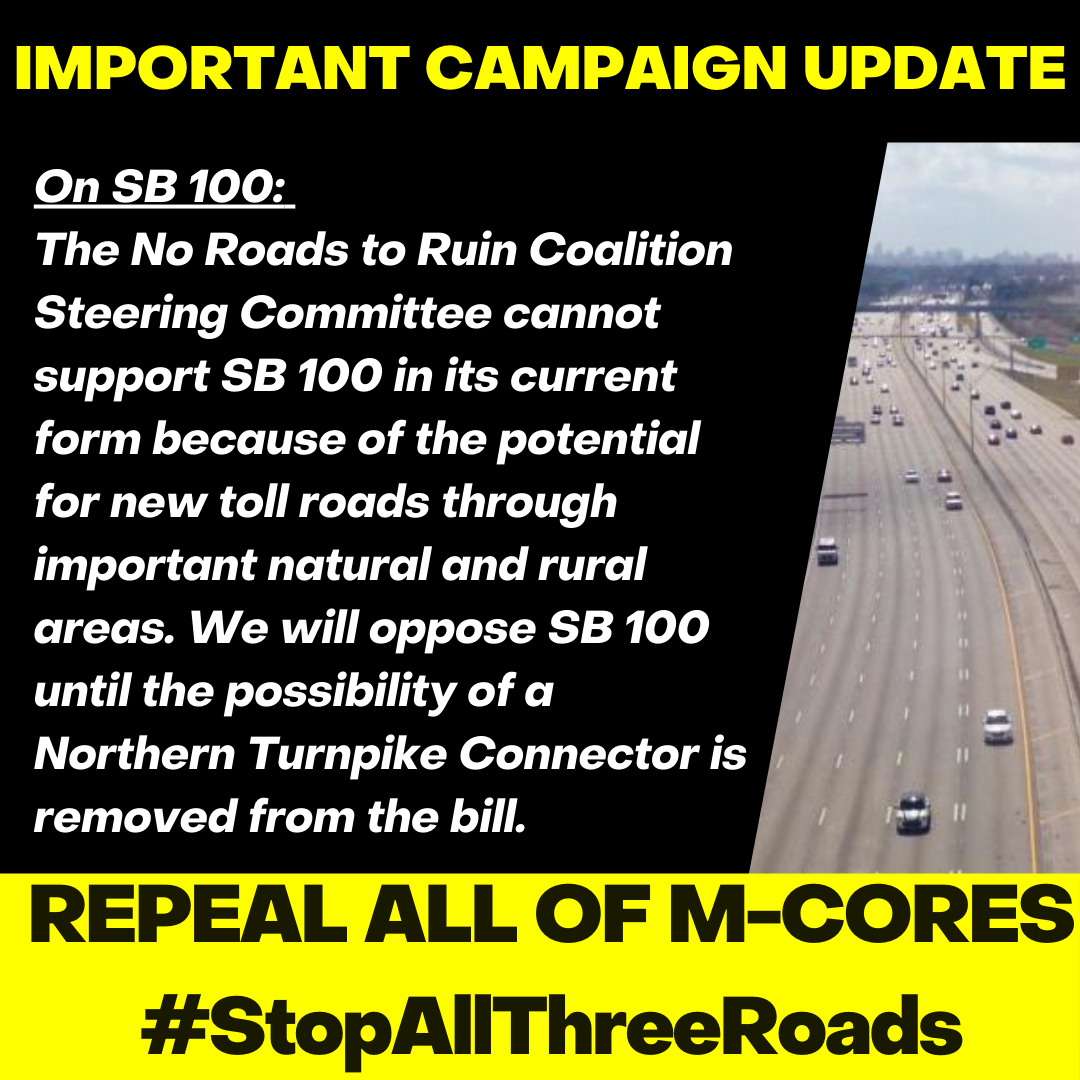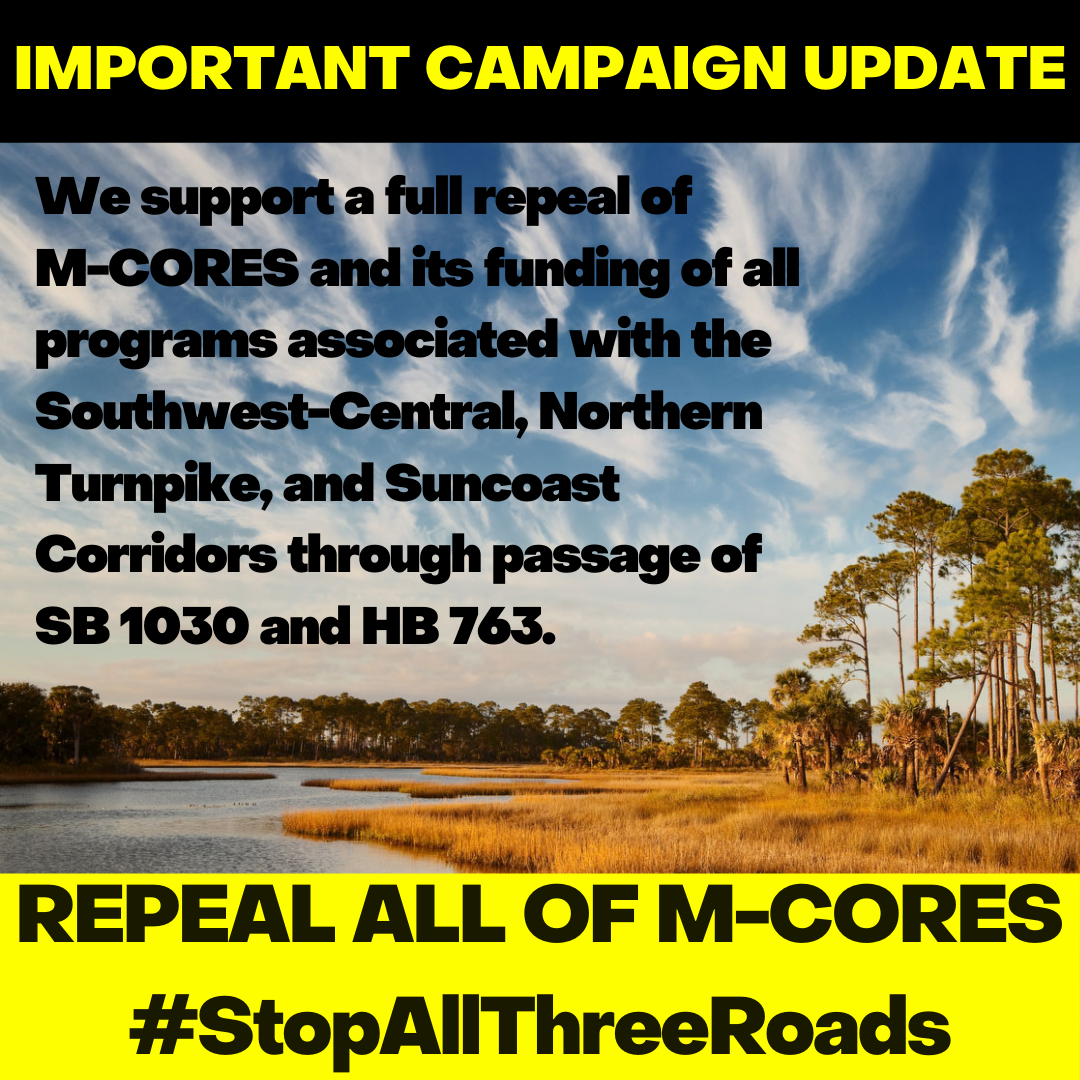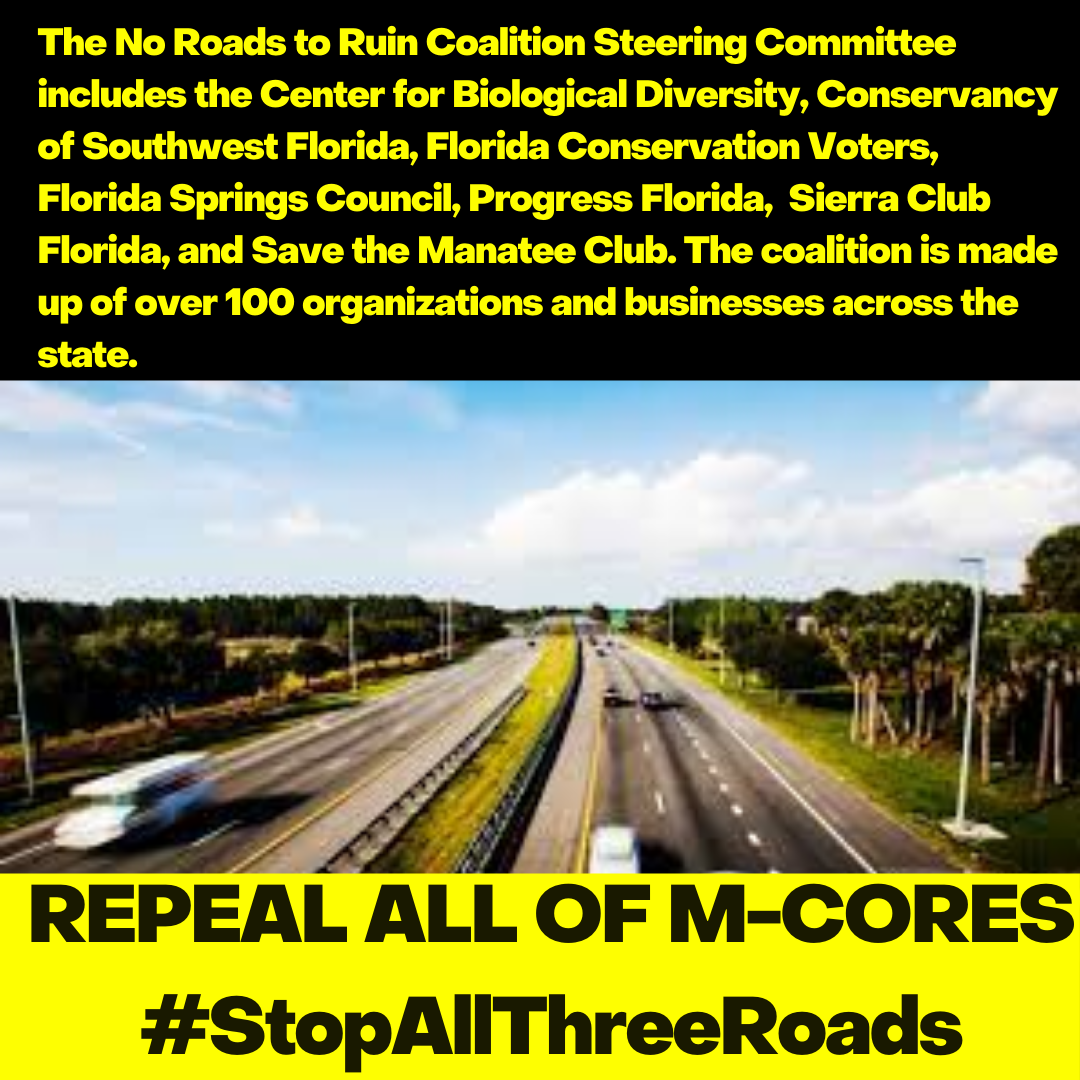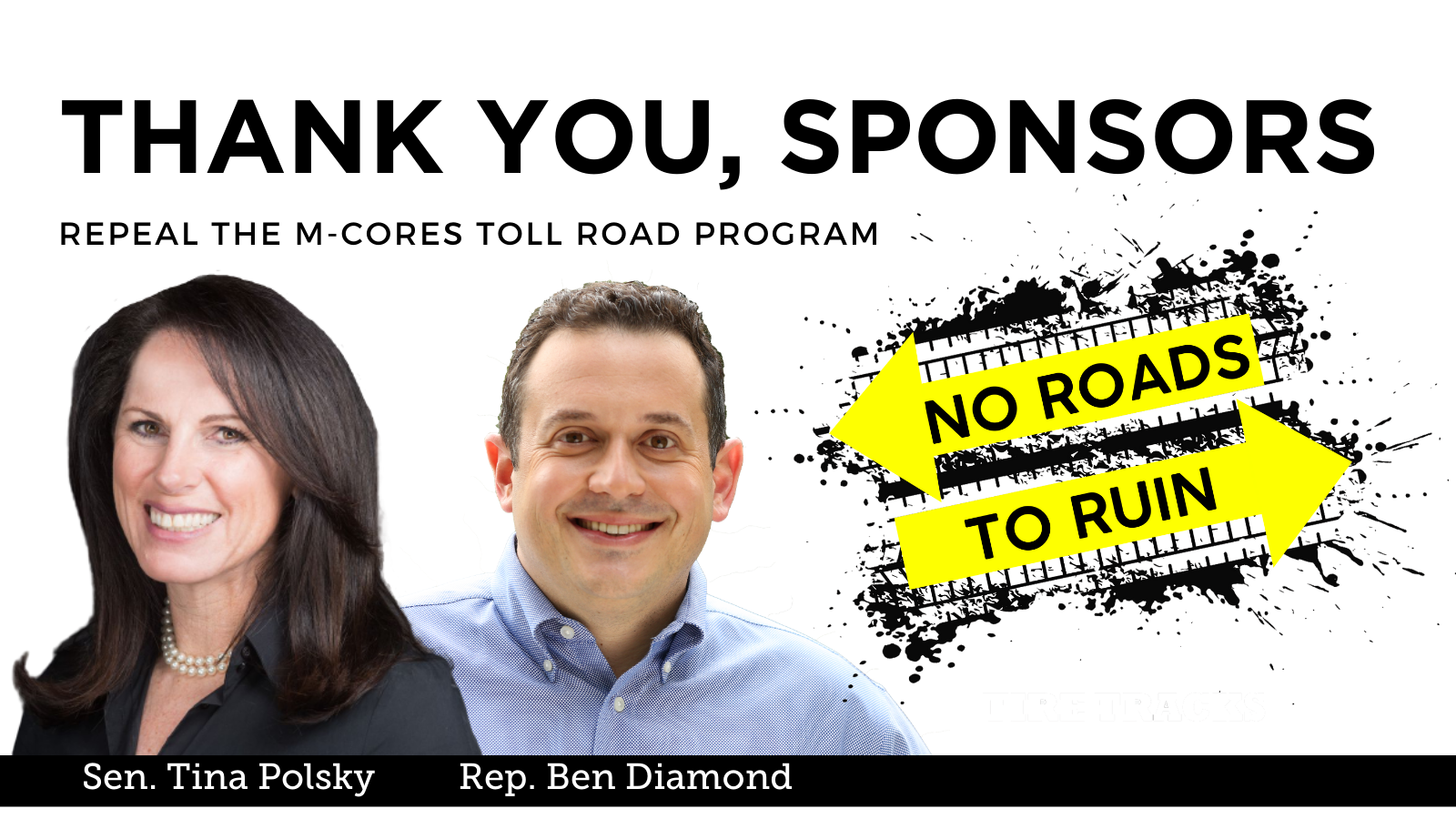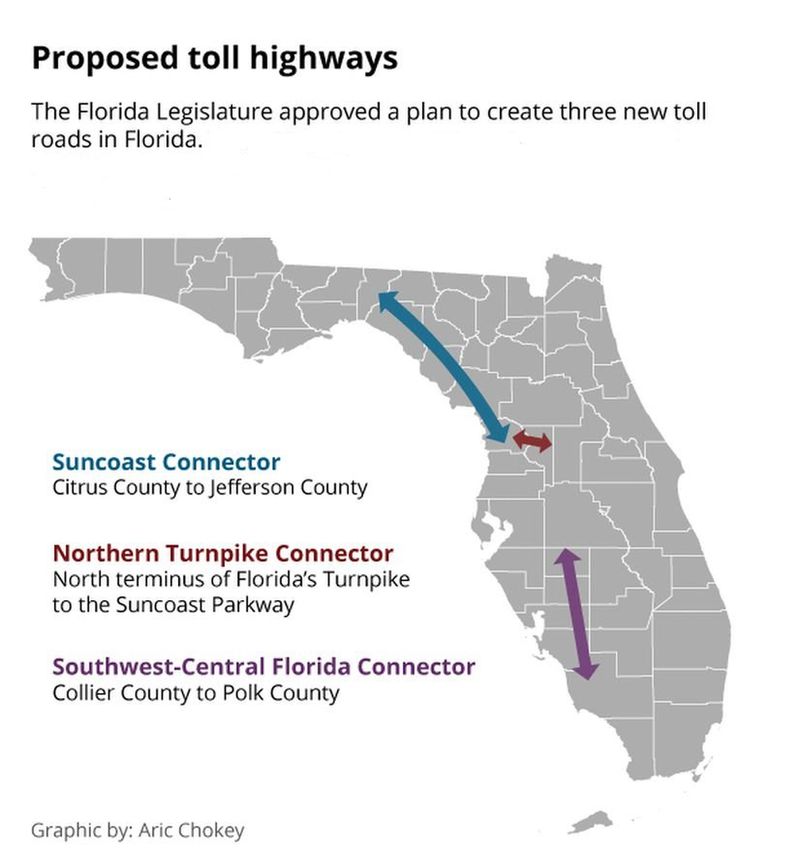No Roads to Ruin Steering Committee Statement on the Passage of SB 100
4/29/21
We are eternally grateful for all the time and effort No Roads to Ruin Coalition partners and individual activists have devoted to this cause. We honor them and their work to ensure a better future for Florida.
The NRTR Steering Committee did not support SB 100 because the bill did not stop all of the roads at the heart of M-CORES. SB 100 moves our state in the wrong direction and leaves North Florida’s rural communities and natural resources at risk. Florida needs a 21st Century transportation policy that takes us away from new roads through environmentally sensitive areas and towards sustainable transportation alternatives. As such, with two of three toll road threats remaining, we cannot proclaim that its passage and expected signing by the Governor as a triumph.
Only two years ago many of the same Florida Legislators who supported SB 100 voted nearly unanimously to approve the three Roads to Ruin. The 2021 Florida legislature had the opportunity to fully repeal M-CORES with the introductions of SB 1030/HB 763. However, neither bill was ever heard in committee.
Removing the toll road that would have imperiled the Western Everglades and existentially threatened the Florida panther is a tremendous relief. With fewer than 230 Florida panthers remaining, protecting them and their habitat is critically important for their survival and recovery. Removal of an imminent Southwest Central Corridor helps with this fight.
What SB 100 does and does not do:
-
Eliminates the M-CORES program but not all the Roads to Ruin included in the program.
-
Eliminates the Southwest-Central Florida Connector in its entirety.
-
Keeps the Northern Turnpike extension on the books with a different timetable.
-
Does not eliminate the threat previously presented by the M-CORES Suncoast Connector.
-
Provides US-19 north from the terminus of the Suncoast Parkway to I-10 as a way to replace the M-CORES Suncoast Connector.
-
Includes the M-CORES task force recommendation of avoiding conservation lands with respect to upgrades of arterial highways, but only "to the greatest extent practicable," and not specifically to the US 19 project.
-
Frees up money once earmarked for M-CORES to be available for needed road projects throughout the state.
This fight isn't over. We must press on together to protect our natural resources and local communities from the Roads to Ruin.
Friday emails will continue (if there are news clips to share) but the NRTR Steering Committee will take a break during the month of May. We hope you take that time to share your ideas and suggestions with us on what steps to take next. We will be back to work as of June 1 to continue to fight these Roads to Ruin.
The No Roads to Ruin Coalition Steering Committee includes the Center for Biological Diversity, Conservancy of Southwest Florida, Florida Conservation Voters, Florida Springs Council, Progress Florida, Sierra Club Florida, and Save the Manatee Club. The coalition is made up of over 100 organizations and businesses across the state.
###
Hillsborough Board of County Commissioners Unanimously pass resolution against ALL of M-CORES
Earlier this week the Hillsborough Board of County Commissioners UNANIMOUSLY (7-0) passed a resolution against ALL THREE of the proposed M-CORES toll roads citing the programs lack of fiscal feasibility, burdensome costs to taxpayers, lack of benefit to Hillsborough County residents, and negative environmental impacts to Florida's remaining rural and wildlands. We want to thank all of the members of the Hillsborough BOCC for sending a strong message to legislators in Tallahassee that reflects the overwhelming public opposition against each of these three toll roads.
More and more local government leaders are making their position against M-CORES clear to stop all three roads #RepealTheRoads
See the agenda from this weeks BOCC meeting (item F-4): https://eagenda.hillsboroughcounty.org/.../open/OBJ561528
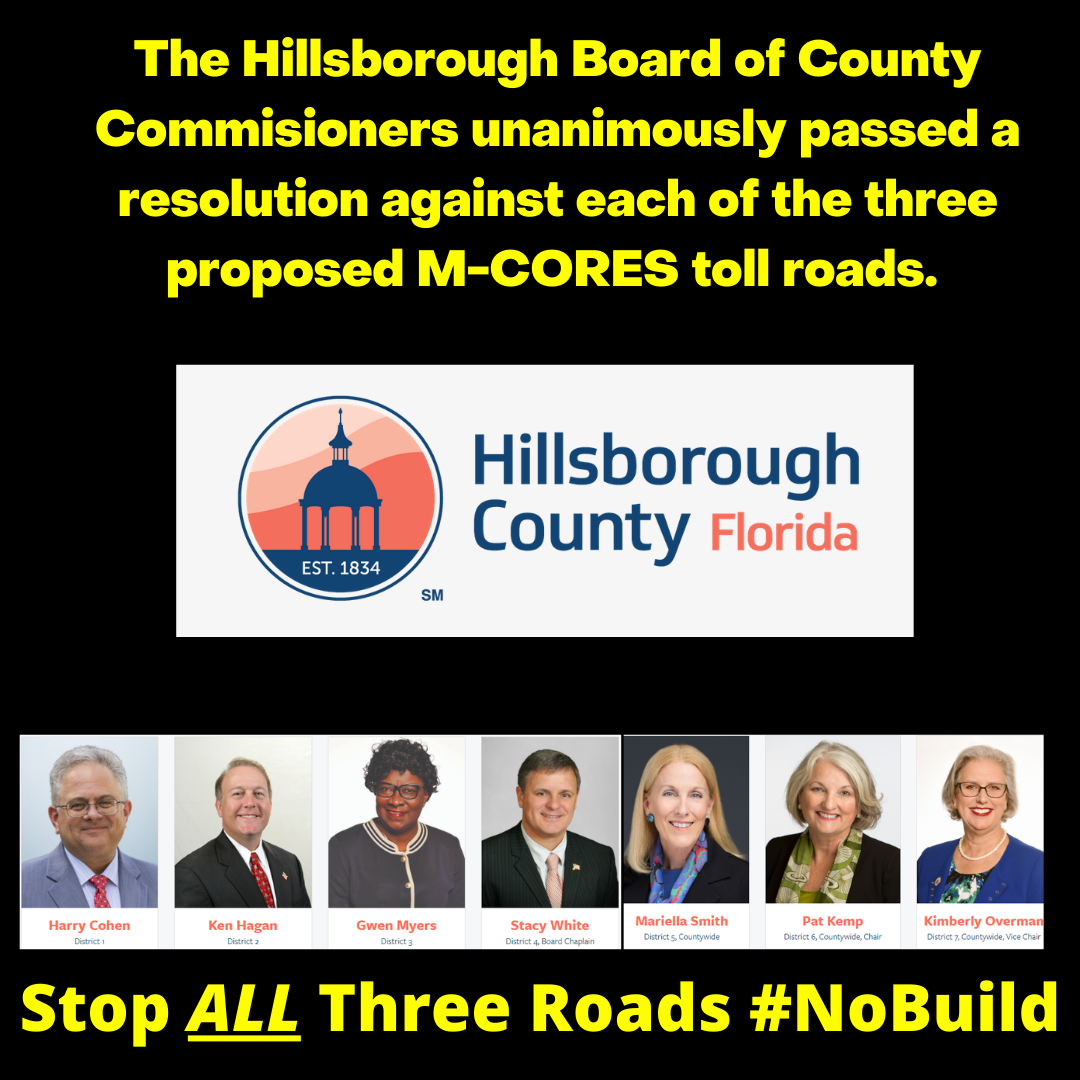
SB 100 Passed FL Senate 39-1
March 26, 2021
Read more about details about SB 100 passing the FL Senate here: https://floridapolitics.com/archives/414968-senate-repeals-m-cores-toll-road-project-still-no-movement-from-house/
Clean Water Conversations with No Roads to Ruin and Friends of the Everglades
March 26, 2021
Friends of the Everglades hosted a No Roads to Ruin Clean Water Conversation that featured Citizens for an Engaged Electorate, Florida Springs Council, Conservancy of Southwest Florida, and Levy County Commissioner Lilly Rooks on a panel that provided updates on the many threats M-CORES presents and where our fight to stop all three M-CORES toll roads stands. You can watch the recording here: https://fb.watch/4tLITdEv5e/
Stop the Roads to Ruin: Don’t Break Florida’s Heart, Don’t Break Florida’s Bank
3/25/21
Students and youth across Florida with groups like the College Democrats at the University of Central Florida, Climate Active Gator, Climate Change Club of American Heritage High School, Florida PIRG Students, Nova Green Sharks, Young Leaders for Wild Florida, and several other students and youth groups organized a virtual advocacy event: Stop the Roads to Ruin: Don’t Break Florida’s Heart, Don’t Break Florida’s Bank with the No Roads to Ruin to Coalition.
This coordinated virtual advocacy event raised awareness of the 330+ miles of toll roads that threaten to pave over Florida's future and activated youth to let lawmakers know that Florida’s future doesn’t need three new toll roads. It also provided three mini-breakout trainings to provide practical skills and tactics that anyone can use to be a better public advocate and make social change on their campus or in their community.
If you weren't able to make the event, you can see the slide deck from the presentation here.
Use your Voice! Stop the Roads to Ruin! Three things you can do TODAY!
- Take action: Call, email, and share with your representatives and friends
- Looking for more ways to get involved or take action? Go here.
Each of the three mini-breakout training presentations is available for your reference below:
- How to Write a Letter to the Editor (LTE)
- Grassroots Lobbying 101
- Sharing Your Story for Social Change
###
No Roads to Ruin Steering Committee Statement Regarding SB 100
03/5/21
The No Roads to Ruin Steering Committee has a new statement regarding SB 100 -- the bill filed by Senator Gayle Harrell that would repeal the M-CORES program, but leave one of the proposed toll roads, the Northern Turnpike Connector, on the books. The Senate Transportation Committee passed SB 100 passed 5-3 this week on 3/3/21:
The No Roads to Ruin Coalition Steering Committee cannot support SB 100 in its current form because of the potential for new toll roads through important natural and rural areas. We will oppose SB 100 until the possibility of a Northern Turnpike Connector is removed from the bill.
Any expansion to existing roadways should depend upon the demonstration of need and fiscal feasibility while not negatively impacting our water and natural resources, rural communities, communities of color, and agricultural lands.
We support a full repeal of M-CORES and its funding of all programs associated with the Southwest-Central, Northern Turnpike, and Suncoast Corridors through the passage of SB 1030 and HB 763.
The No Roads to Ruin Coalition Steering Committee includes the Center for Biological Diversity, Conservancy of Southwest Florida, Florida Conservation Voters, Florida Springs Council, Progress Florida, Sierra Club Florida, and Save the Manatee Club. The coalition is made up of over 100 organizations and businesses across the state.
###
M-CORES Repeal Bill Announced, Met with Resounding Applause from Leaders Across the State
M-CORES Repeal Bill Announced, Met with Applause from Leaders Across the State
On behalf of the 106 organizations and business and thousands of Floridians our coalition collectively representing in our membership, we want to extend out thanks to both Representative Ben Diamond and Senator Tina Polsky for their leadership to champion legislation that will eliminate the M-CORES toll roads threat helping to save Florida taxpayers hundreds of millions of dollars, protect our treasured environment, and our state's future. You can see a recording of the virtual press event where they announced the repeal bill here along with other leaders from across the state of Florida: https://fb.watch/3qDIGJfhGd/
For Immediate Release
February 3, 2021
Contacts: Ryan Smart, smart@floridaspringscouncil.
**PRESS RELEASE**
RESOUNDING APPLAUSE FOR M-CORES REPEAL BILL
Elimination of the proposed boondoggle is just what the state needs
TALLAHASSEE -- The announcement today of a bill filed in the Senate (SB1030) and soon to be filed in the House, to repeal the bill that created M-CORES, the program that would construct 330 miles of unneeded and fiscally dangerous toll roads through rural Florida, was welcomed by No Roads to Ruin Coalition partners from across the state. After 93% of public comments were opposed to M-CORES, the failure by FDOT and outside analysts to identify any need at all for these roads, and the brutally obvious fiscal reasons to stop the M-CORES process in its tracks, repealing the bill and devoting the billions of dollars it would have devoured instead to critical state needs is exactly what Floridians need.
Newton Cook, President of United Waterfowlers of Florida said, “United Wildfowlers of Florida opposes the toll roads because they will bring urbanization and sprawl to natural lands. The toll roads are directly in the path of the Florida wildlife corridor, lands that are essential for connections between South Florida to the Panhandle. New toll roads are unnecessary and existing roads can be expanded or improved upon.”
Bill Maturo of Florida Veterans for Common Sense stated, “Florida Veterans for Common Sense, a not for profit organization composed of veterans throughout Florida, is adamantly opposed to the construction of these toll roads. We believe that climate change is a national security issue, and that anything that contributes to, rather than mitigates, climate change is a threat to our country. The construction of these roads will add in many ways to the warming of our state and nation, and should be eliminated.”
"The League of Women Voters of Florida does not believe that the M-CORES project was properly conceived or vetted by the legislature. Public opinion has shown that these roads are not currently needed nor are they necessary in the near future. Additionally, the roads have the potential to greatly damage our vital Florida ecosystem" said Patti Brigham, President of the League of Women Voters of Florida.
Emma Haydocy, Executive Director for Florida Bay Forever added, "I can think of no better way to celebrate World Wetlands Day than with the introduction of a bill to repeal M-CORES. At a time when all Floridians, from the Panhandle to the Florida Keys, face steep challenges in water quality, climate change, and restoring America's Everglades, this timely legislation will ensure that we build, rather than diminish, our resilience to these threats in the decades to come."
Stacey Gallagher, Development Coordinator for the Sea Turtle Conservancy, said, “The shallow seagrass beds along the Big Bend coastline of Florida are a globally-important developmental habitat for young green, loggerhead and Kemp’s ridley sea turtles. This habitat is incredibly vulnerable to runoff and other impacts from overdevelopment, which inevitably will occur if the disastrous M-CORES plan moves forward. We must repeal M-CORES now and ensure that this fragile marine ecosystem is preserved for the future."
"The M-CORES toll roads are an unwanted, inadequate, and uninspired response to automobile traffic in Florida. We cannot allow our imagination to become limited—let us exhaust all other options to invest in existing infrastructure. Don't force the words 'I told you so' into the mouths of your children and grandchildren: repeal the roads!" said Emma Turner of Young Leaders for Wild Florida.
Background:
In 2019, the Florida state legislature passed SB 7068 to authorize the design and construction of 330 miles of new toll roads through the heart of rural Florida. The bill creating the Multi-use Corridors of Regional Economic Significance (M-CORES) was signed into law by Governor Ron DeSantis on May 17, 2019, despite a veto request from over 90 organizations and businesses from across Florida.
The No Roads to Ruin Coalition, devoted to stopping the unneeded and costly plan, was launched in August 2019 and is now 106 organizations and businesses strong. For more information go to the No Roads to Ruin website: https://noroadstoruin.org/
####
Florida cannot afford, and doesn’t need, three new toll roads through the boondocks | Editorial
Florida cannot afford, and doesn’t need, 3 new toll roads through the boondocks
Paving pristine rural areas for three politically-motivated toll roads made no sense even before the coronavirus raged across Florida.
But with COVID-19 hitting the state budget hard, forging ahead with these boondoggles represents a classic case of misguided priorities — right up there with the Cross-Florida Barge Canal.
Given the state’s precarious finances, even the new chairman of the budget-writing Senate Appropriations Committee, Sen. Kelli Stargel, R-Lakeland, is skeptical about the need for these rural roads. Florida’s soaring Medicaid caseloads and the pandemic’s effects on public school budgets are urgent needs, she said, while the state’s long-range infrastructure can wait.
“It’s going to be a tough budget year,” Stargel told Capitol reporters recently. “A lot of the infrastructure things we had put into place may have to go to a little bit of a hold. We just don’t have the funds.”
The toll roads were the pet project of former Florida Senate President Bill Galvano, a Bradenton Republican, who made them his one demand in any deal sought by the Florida House and Gov. Ron DeSantis two years ago.
The Bradenton Republican claimed the through-fares would nurture economic growth in isolated communities, even though a significant number of affected communities have since said they don’t want them.
He also said the roads would create more hurricane escape routes, though Georgia officials have since said their roads aren’t prepared for new inroads from Florida. Besides, emergency planners now say it’s better for evacuees to shelter closer to home.
Galvano also glossed over the dangers to water and wildlife, including the protected Florida panther. Worse, he jumped the three toll roads to the front of Florida’s ten-year transportation plan, ignoring far more worthy projects whose backers had played by the rules.
At a minimum cost of $25 million a mile, these rural toll roads are expected to cost $26 billion — about one-fourth of this year’s state budget — over the next decade.
Together, the project known as M-CORES — for Multi-Use Corridors of Regional Economic Significance — would add about 330 miles of new toll roads in the state’s lightly-traveled, land-locked interior.
One road would connect Florida’s Turnpike to the Suncoast Parkway at Crystal River in Citrus County; another would extend the Suncoast north to the Georgia line in Jefferson County, just east of Tallahassee. The third would cut through Florida’s heartland from Collier County in Naples north to Polk County, between Orlando and Tampa.
Three regional task forces have held hearings about the roads and have heard overwhelming public opposition to all three. Nevertheless, like a bulldozer on autopilot, the Florida Department of Transportation is moving ahead with the next expensive planning phase, following the Legislature’s orders.
Yet not a single comprehensive study says these rural roads are needed. Even the three regional task forces, with broad representation from all levels of government, could not establish a need for them. As FDOT’s chief engineer, Will Watts, told the Senate Transportation Committee on Jan. 12: “The need for the full length of the corridor has not been determined.”
With Florida facing a budget deficit of an estimated $5.4 billion over two years, and with so much intense grass-roots opposition, there’s simply no justification to move forward.
In rural Levy County, where two of the toll roads would converge, commissioners favor a “no build” option. The U.S. Public Interest Research Group included M-CORES on a list of the biggest transportation boondoggles in the country. Even Florida TaxWatch, a business-backed policy group that has long supported tax-supported transportation projects, raises serious doubts as to whether the Suncoast Connector can meet financial conditions required by law.
“A risky project,” TaxWatch called the connector, “with little demonstrated transportation need.”
To satisfy bondholders, there must be sufficient traffic on the three new roads. State law says per-mile toll receipts must meet or exceed receipts on the much busier Florida’s Turnpike to pay the costs of construction. But given the lack of need, that’s a risky gamble.
As a leading environmental group, 1000 Friends of Florida, has noted, in this time of deep economic uncertainty, it is fiscally irresponsible for the state to commit billions of dollars to roads with no demonstrated need or financial feasibility. To further complicate matters, the coronavirus has decimated state transportation revenues because people are driving a lot less.
By law, construction on these toll roads must begin by Dec. 31, 2022. That’s why, with legislative committees preparing the agenda for the annual spring session, something needs to happen now.
It can be tough to challenge the pet project of a predecessor, but today’s Senate President, Wilton Simpson, has shown a willingness to do so. A couple months back, he tried to pull the plug on former Senate President Joe Neuron’s pet project — a much-needed reservoir south of Lake Okeechobee.
Simpson has a far stronger case for pulling the plug on these unneeded and unwanted rural toll roads. Florida has higher priorities.
Editorials are the opinion of the Sun Sentinel Editorial Board and written by one of its members or a designee. The Editorial Board consists of Editorial Page Editor Rosemary O’Hara, Dan Sweeney, Steve Bousquet and Editor-in-Chief Julie Anderson.
Jefferson County Commissioners say “no” to toll road
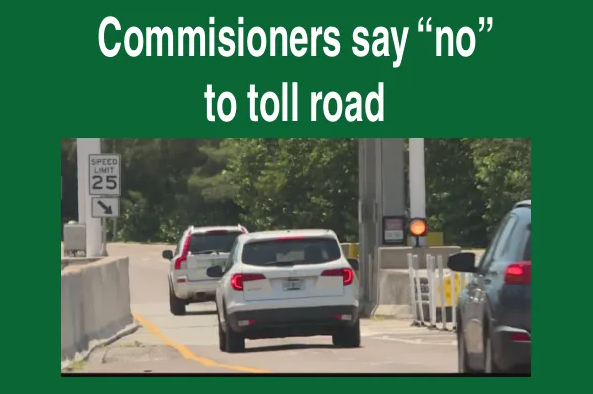
By Lazaro Aleman
ECB Publishing
The Jefferson County Commission has now adopted a resolution expressing opposition to the Suncoast Connector toll road and requesting that the state not build any portion of the proposed highway in Jefferson County.
The ‘Highway Boondoggles’ That the Pandemic Hasn’t Killed
The ‘Highway Boondoggles’ That the Pandemic Hasn’t Killed
By Laura Bliss
Bloomberg
Excerpt: The largest on the list is Florida’s M-CORES project, a $10 billion, 330-mile plan to build three toll roads through rural southwest and central Florida. Dubbed the “Billionaire Boulevard” by critics who characterize the project as a handout to developers, a state task force recently found a lack of “specific need” for any of the roads, which would run through environmentally sensitive areas.
